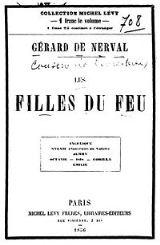
Les Filles du feu
Encyclopedia
Les Filles du feu is a collection of short stories published by the French
poet
Gérard de Nerval
during January 1854, a year before his death. During 1853, Nerval had suffered three nervous breakdown
s and spent five months in an asylum
, and he saw Les Filles du feu as an opportunity to show the public, his friends, and his father that he was sane.
However, all of the short stories in Les Filles du feu had been published previously: "Angélique" in Les Faux Saulniers (1850), "Sylvie" in La Revue des Deux Mondes (1853), and "Emilie," "Jemmy," "Isis," and "Octavie" in multiple reviews.
tale of a man who is haunted by the memory of three women in his life, all who seem to blend together. The story opens with the narrator at the theatre, where he is enamored an actress named Aurélie. He is suddenly reminded of a memory from childhood, and he experiences a flashback. First, he remembers a festival where he danced with a local girl named Sylvie but was entranced by Adrienne, a young noble (whose resemblance to Aurélie is what brings on the flashback). Adrienne ultimately becomes a nun.
As Adrienne is unobtainable, he returns to Sylvie several years later and spends many days with her. As they pass by a monastery
, the narrator mentions Adrienne, much to Sylvie's dismay. He returns to Paris
.
The narrator returns, and Sylvie and he spend a day socializing at an elderly relative's home. However, nothing results from this, and the narrator leaves again.
Finally, Sylvie marries someone else, and the narrator pursues Aurélie, the actress, more aggressively. They become friendly, and the narrator asks her if she ever spent time in a convent, associating her with Adrienne. Ultimately, Aurélie ends her relationship with the narrator, and the narrator returns one final time to Sylvie, now a mother. When he asks about Adrienne, Sylvie reveals that she has been dead many years.
woman and makes a rendez-vous with her. Meanwhile, he visits the home of a local woman, who reminds him of an actress he once knew.
 Emilie is the final story of the collection. It is the story of Desrochers, a French
Emilie is the final story of the collection. It is the story of Desrochers, a French
lieutenant serving near Bitche in Lorraine near the German border, defending it against the threat of Prussian attacks some time after 1815. He is wounded in the face, and while he is being healed in Metz, he meets and befriends Emilie, a young woman from Haguenau (Alsace), and her aunt. The two become enamored of each other and decide to marry in her home town. The night before the civil ceremony, they stop at Bitche. Desrochers tells some fellow soldiers about how he "killed the first and only man I ever struck in hand-to-hand fighting" during a Prussian attempt on the fort of Bitche. The next day Desrochers, his wife, and her brother Wilhelm leave. At an inn, Wilhelm argues with Desrochers' acquantances about his father's death by a French soldier at the same fort in Bitche. The soldiers are surprised at how similar Wilhelm's story is to Desrochers'. The next day, Wilhelm asks Desrochers to give him a tour of the fort, and when they get to the spot where Wilhelm's father was killed, Wilhelm accuses Desrochers and challenges him to a duel. Emilie sends a priest to intervene, but Desrochers realizes that he and his wife can never be happy, as he was her father's killer. Desrochers re-enlists and is killed on the front line; Emilie retires to a convent.
French people
The French are a nation that share a common French culture and speak the French language as a mother tongue. Historically, the French population are descended from peoples of Celtic, Latin and Germanic origin, and are today a mixture of several ethnic groups...
poet
Poet
A poet is a person who writes poetry. A poet's work can be literal, meaning that his work is derived from a specific event, or metaphorical, meaning that his work can take on many meanings and forms. Poets have existed since antiquity, in nearly all languages, and have produced works that vary...
Gérard de Nerval
Gérard de Nerval
Gérard de Nerval was the nom-de-plume of the French poet, essayist and translator Gérard Labrunie, one of the most essentially Romantic French poets.- Biography :...
during January 1854, a year before his death. During 1853, Nerval had suffered three nervous breakdown
Nervous breakdown
Mental breakdown is a non-medical term used to describe an acute, time-limited phase of a specific disorder that presents primarily with features of depression or anxiety.-Definition:...
s and spent five months in an asylum
Psychiatric hospital
Psychiatric hospitals, also known as mental hospitals, are hospitals specializing in the treatment of serious mental disorders. Psychiatric hospitals vary widely in their size and grading. Some hospitals may specialise only in short-term or outpatient therapy for low-risk patients...
, and he saw Les Filles du feu as an opportunity to show the public, his friends, and his father that he was sane.
However, all of the short stories in Les Filles du feu had been published previously: "Angélique" in Les Faux Saulniers (1850), "Sylvie" in La Revue des Deux Mondes (1853), and "Emilie," "Jemmy," "Isis," and "Octavie" in multiple reviews.
Sylvie
Sylvie is a semi-autobiographicalAutobiography
An autobiography is a book about the life of a person, written by that person.-Origin of the term:...
tale of a man who is haunted by the memory of three women in his life, all who seem to blend together. The story opens with the narrator at the theatre, where he is enamored an actress named Aurélie. He is suddenly reminded of a memory from childhood, and he experiences a flashback. First, he remembers a festival where he danced with a local girl named Sylvie but was entranced by Adrienne, a young noble (whose resemblance to Aurélie is what brings on the flashback). Adrienne ultimately becomes a nun.
As Adrienne is unobtainable, he returns to Sylvie several years later and spends many days with her. As they pass by a monastery
Monastery
Monastery denotes the building, or complex of buildings, that houses a room reserved for prayer as well as the domestic quarters and workplace of monastics, whether monks or nuns, and whether living in community or alone .Monasteries may vary greatly in size – a small dwelling accommodating only...
, the narrator mentions Adrienne, much to Sylvie's dismay. He returns to Paris
Paris
Paris is the capital and largest city in France, situated on the river Seine, in northern France, at the heart of the Île-de-France region...
.
The narrator returns, and Sylvie and he spend a day socializing at an elderly relative's home. However, nothing results from this, and the narrator leaves again.
Finally, Sylvie marries someone else, and the narrator pursues Aurélie, the actress, more aggressively. They become friendly, and the narrator asks her if she ever spent time in a convent, associating her with Adrienne. Ultimately, Aurélie ends her relationship with the narrator, and the narrator returns one final time to Sylvie, now a mother. When he asks about Adrienne, Sylvie reveals that she has been dead many years.
Octavie
Octavie is the story of a narrator who journeys to Italia. While he is there, he meets a young EnglishEnglish people
The English are a nation and ethnic group native to England, who speak English. The English identity is of early mediaeval origin, when they were known in Old English as the Anglecynn. England is now a country of the United Kingdom, and the majority of English people in England are British Citizens...
woman and makes a rendez-vous with her. Meanwhile, he visits the home of a local woman, who reminds him of an actress he once knew.
Emilie

French people
The French are a nation that share a common French culture and speak the French language as a mother tongue. Historically, the French population are descended from peoples of Celtic, Latin and Germanic origin, and are today a mixture of several ethnic groups...
lieutenant serving near Bitche in Lorraine near the German border, defending it against the threat of Prussian attacks some time after 1815. He is wounded in the face, and while he is being healed in Metz, he meets and befriends Emilie, a young woman from Haguenau (Alsace), and her aunt. The two become enamored of each other and decide to marry in her home town. The night before the civil ceremony, they stop at Bitche. Desrochers tells some fellow soldiers about how he "killed the first and only man I ever struck in hand-to-hand fighting" during a Prussian attempt on the fort of Bitche. The next day Desrochers, his wife, and her brother Wilhelm leave. At an inn, Wilhelm argues with Desrochers' acquantances about his father's death by a French soldier at the same fort in Bitche. The soldiers are surprised at how similar Wilhelm's story is to Desrochers'. The next day, Wilhelm asks Desrochers to give him a tour of the fort, and when they get to the spot where Wilhelm's father was killed, Wilhelm accuses Desrochers and challenges him to a duel. Emilie sends a priest to intervene, but Desrochers realizes that he and his wife can never be happy, as he was her father's killer. Desrochers re-enlists and is killed on the front line; Emilie retires to a convent.
External links
- Les Filles du feu in FrenchFrench languageFrench is a Romance language spoken as a first language in France, the Romandy region in Switzerland, Wallonia and Brussels in Belgium, Monaco, the regions of Quebec and Acadia in Canada, and by various communities elsewhere. Second-language speakers of French are distributed throughout many parts...
at Gallica

